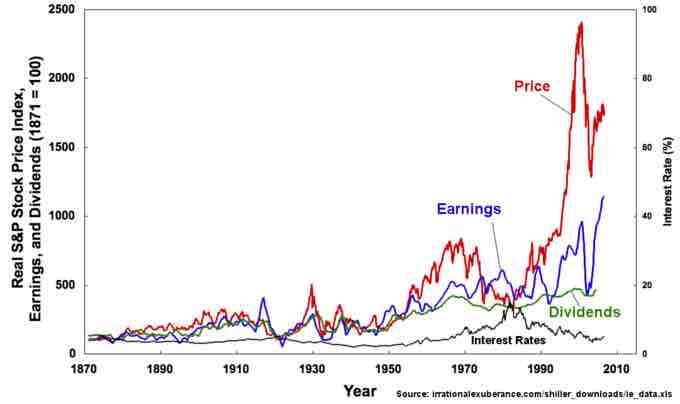Proportional Payment
A dividend is allocated as a fixed amount per share. Therefore, a shareholder receives a dividend in proportion to their shareholding.
Cash
Cash dividends are those paid out in currency, usually via electronic funds transfer or a printed paper check. Such dividends are a form of investment income and are usually taxable to the recipient in the year they are paid. This is the most common method of sharing corporate profits with the shareholders of the company. For each share owned, a declared amount of money is distributed. Thus, if a person owns 100 shares and the cash dividend is 50 cents per share, the holder of the stock will be paid 50 dollars. Dividends paid are not classified as an expense, but rather a deduction of retained earnings. Dividends paid does not show up on a Income Statement but does appear on the Balance Sheet.

Real S&P Prices, Earnings, and Dividends 1871-2006
A graph visualizing S&P's prices, earnings, and dividends over a 130-year period. Earnings and dividends have risen steadily over time; price spiked substantially around 2000 and is only slightly lower now.
Stock
Stock or scrip dividends are those paid out in the form of additional stock shares of the issuing corporation or another corporation, such as its subsidiary corporation. They are usually issued in proportion to shares owned. For example, for every 100 shares of stock owned, a 5% stock dividend will yield 5 extra shares. If the payment involves the issue of new shares, it is similar to a stock split: it increases the total number of shares while lowering the price of each share without changing the market capitalization, or total value, of the shares held.
Property
Property dividends or dividends in specie (Latin for "in kind") are those paid out in the form of assets from the issuing corporation or another corporation, such as a subsidiary corporation. They are relatively rare and most frequently are securities of other companies owned by the issuer. However, they can take other forms, such as products and services.
Interim Dividends
Interim dividends are dividend payments made before a company's annual general meeting and final financial statements. This declared dividend usually accompanies the company's interim financial statements.
Other
Other dividends can be used in structured finance. Financial assets with a known market value can be distributed as dividends; warrants are sometimes distributed in this way. For large companies with subsidiaries, dividends can take the form of shares in a subsidiary company. A common technique for "spinning off" a company from its parent is to distribute shares in the new company to the old company's shareholders. The new shares can then be traded independently.